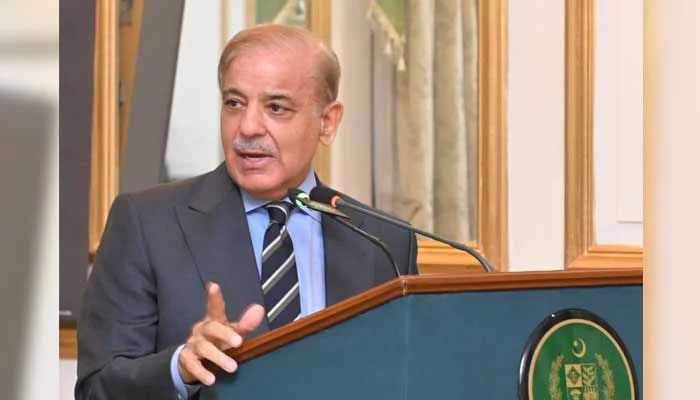Fiscal crisis
LAHORE: The ruling coalition is keeping its economic strategy a secret and the way Prime Minister Shahbaz Sharif is announcing goodies for the electorate without the formation of a cabinet suggests that public appeasing is still on the back of the mind of the ruling elite.
As a matter of principle, no incentives should be announced until a cabinet is formed and the finance minister takes command of financial matters.
Every sane person and even the poor thinks that time is not ripe for any concessions right now when we are almost drowning in debt that increases every day instead of stabilizing at some point.
People generally are not hopeful about the ability of this regime to deliver. But a few optimistic ones think that they have learned their lesson and would take the required difficult steps to save Pakistan from going down further.
This is not the time for burdening the exchequer with any further financial burden. This time, squeeze all unnecessary and luxurious expenses. The government must operate with a clear mind that they will follow the right economic path. The image of the government is bound to go down further because the right measures would hurt the public at large. But then, the government was already not very popular.
For the first two years, the government should cut all expenditures prudently to the maximum limit. It should aim to reduce recurring expenditures by at least Rs500 billion. It must ensure that it collects at least Rs1,500 billion from loss making public sector enterprises within two years.
This will also spare at least Rs500 billion that the government has to spend each year for keeping these entities afloat. During this two-year period, the state should exert its writ to eliminate corruption, theft and mismanagement in the power sector to the extent that bleeding from this sector reduces to Rs200 billion per year instead of Rs600 billion as the PM Sharif admitted in a recent speech. These targets are achievable if the government exerts its writ.
The reason that the government shies away from exerting its writ is because these measures would hurt vested interests that are beneficiaries of this system. These measures in two years could spare Rs2,900 billion that we spend yearly. The fiscal deficit would come under control.
Still, we would need additional revenues to move ahead as a respectable nation. The revenue target should be fixed in terms of percentage of GDP instead of fixing a monetary target. The IMF has recently informed the government that despite a substantial increase in tax revenues, the tax to GDP ratio this year would still be around 10.1 percent. The reason for the low tax to GDP ratio is the existence of a large grey economy. It is time that instead of increasing the tax rates further, the government should bring the tax evading sectors into the tax net.
Besides traders, that include both small and large traders, the tax evasion is rampant in the health sector (doctors, private hospitals and clinics, and the clinical laboratories), lawyers, architects, beauty parlors, restaurants and numerous smaller services.
Taking action against them would create a roar as most of them command respect in the society. The tax to GDP ratio and the actual tax would increase if these professions are properly taxed. The coalition would have to show patience as things would start improving after two years and with some luck, the ruling coalition would be able to please the majority of the electorate.
-
 What You Need To Know About Ischemic Stroke
What You Need To Know About Ischemic Stroke -
 Shocking Reason Behind Type 2 Diabetes Revealed By Scientists
Shocking Reason Behind Type 2 Diabetes Revealed By Scientists -
 SpaceX Cleared For NASA Crew-12 Launch After Falcon 9 Review
SpaceX Cleared For NASA Crew-12 Launch After Falcon 9 Review -
 Meghan Markle Gives Old Hollywood Vibes In New Photos At Glitzy Event
Meghan Markle Gives Old Hollywood Vibes In New Photos At Glitzy Event -
 Simple 'finger Test' Unveils Lung Cancer Diagnosis
Simple 'finger Test' Unveils Lung Cancer Diagnosis -
 Groundbreaking Treatment For Sepsis Emerges In New Study
Groundbreaking Treatment For Sepsis Emerges In New Study -
 Roblox Blocked In Egypt Sparks Debate Over Child Safety And Digital Access
Roblox Blocked In Egypt Sparks Debate Over Child Safety And Digital Access -
 Savannah Guthrie Addresses Ransom Demands Made By Her Mother Nancy's Kidnappers
Savannah Guthrie Addresses Ransom Demands Made By Her Mother Nancy's Kidnappers -
 OpenAI Reportedly Working On AI-powered Earbuds As First Hardware Product
OpenAI Reportedly Working On AI-powered Earbuds As First Hardware Product -
 Andrew, Sarah Ferguson Refuse King Charles Request: 'Raising Eyebrows Inside Palace'
Andrew, Sarah Ferguson Refuse King Charles Request: 'Raising Eyebrows Inside Palace' -
 Adam Sandler Reveals How Tom Cruise Introduced Him To Paul Thomas Anderson
Adam Sandler Reveals How Tom Cruise Introduced Him To Paul Thomas Anderson -
 Washington Post CEO William Lewis Resigns After Sweeping Layoffs
Washington Post CEO William Lewis Resigns After Sweeping Layoffs -
 North Korea To Hold 9th Workers’ Party Congress In Late February
North Korea To Hold 9th Workers’ Party Congress In Late February -
 All You Need To Know Guide To Rosacea
All You Need To Know Guide To Rosacea -
 Princess Diana's Brother 'handed Over' Althorp House To Marion And Her Family
Princess Diana's Brother 'handed Over' Althorp House To Marion And Her Family -
 Trump Mobile T1 Phone Resurfaces With New Specs, Higher Price
Trump Mobile T1 Phone Resurfaces With New Specs, Higher Price




